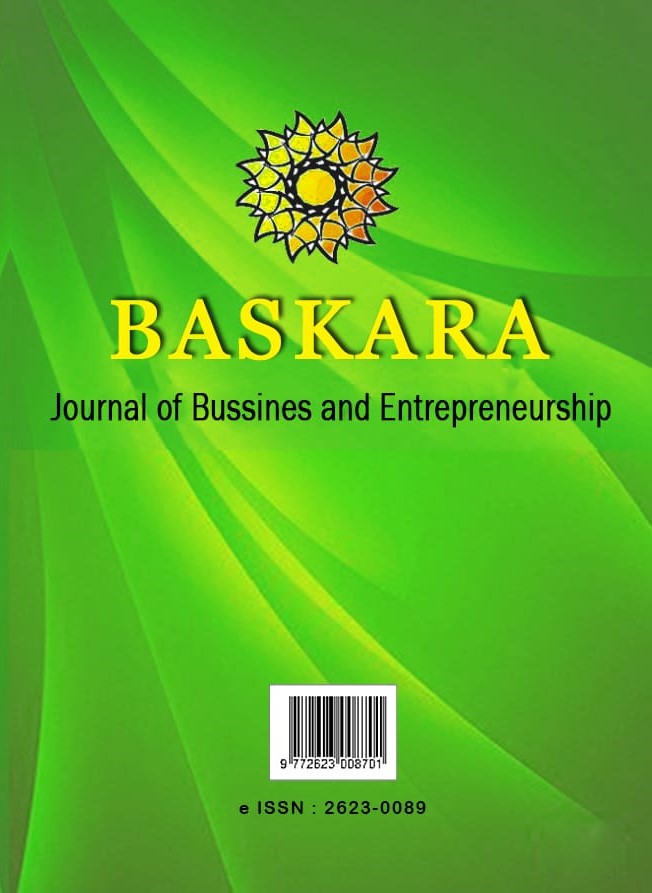The Effect of Financial Literacy, Financial Knowledge, Financial Attitudes and Personality on Financial Management Behavior in MSME
DOI:
https://doi.org/10.54268/baskara.v5i2.15292Keywords:
Financial Literacy, Financial Knowledge, Financial Attitude, Personality, Financial Management Behavior.Abstract
The research was conducted with the aim of examining the influence of financial literacy, financial knowledge, financial attitudes and personality on financial management behavior. The subjects in this examine were Micro, Small and Medium Enterprises (MSMEs) in Banyumas Regency with a population of 8,542 MSMEs and the sample in this observe was 159 MSMEs. Information were dissected the utilizing validity test, reliability test, descriptive analysis, classical assumption test, and multiple regression test. The study demonstrates that financial literacy, financial knowledge, financial attitudes, and personality traits have a significant and positive impact on financial management behavior. Based on this research, financial management behavior for MSME is very important, MSME must understand how important it is to understand financial literacy, financial knowledge, financial attitudes and personality. Thus, some Banyumas MSMEs have implemented good financial management behaviors and can be an example for other MSMEs.References
Doe, Jane (2018). Common Knowledge for Startups. Jakarta: Publishing Company.
Sugiyono (2021). Metode Penelitian Kuantitatif Kualitatif dan R&D. Bandung : Alphabet.
Adiputra, I. G., & Patricia, E. (2020). The Effect of Financial Attitude , Financial Knowledge , and Income on Financial Management Behavior. 439(Ticash 2019), 107–112.
Ajzen, I. (1991). Theory of Planned Behavior. Organizational Behavior and Human Decision Processe. Health Communication.
Almaududi Ausat, A. M., & Suherlan, S. (2021). Obstacles and Solutions of MSMEs in Electronic Commerce during Covid-19 Pandemic: Evidence from Indonesia. BASKARA : Journal of Business and Entrepreneurship, 4(1), 11–19. https://doi.org/10.54268/baskara.4.1.11-19
Amalia, N., & Hamdani, M. L. (2022). Analisis pengaruh sikap finansial , pengalaman finansial dan kepribadian terhadap perilaku manajemen keuangan dimediasi oleh literasi finansial. 4(5), 2224–2233.
Andriyani, P., & Sulistyowati, A. (2021). Analisis Pengaruh Literasi Keuangan, Inklusi Keuangan, Dan Tingkat Pendidikan Terhadap Perilaku Keuangan Pelaku Umkm Kedai/Warung Makanan Di Desa Bahagia Kabupaten Bekasi. Aliansi : Jurnal Manajemen Dan Bisnis, 16(2), 61–70. https://doi.org/10.46975/aliansi.v16i2.100
Ariwibawa. (2016). Pengaruh Literasi Keuangan Terhadap Kinerja Dan Keberlangsungan Umkm Di Jawa Tengah. Jurnal Siasat Bisnis, 20(1), 1–13.
Ausat, A. M. A., & Suherlan, S. (2021). Obstacles and solutions of MSMEs in electronic commerce during covid-19 pandemic: evidence from Indonesia. BASKARA: Journal of Business and Entrepreneurship, 4(1), 11-19.
Cahyaningrum, B., & Fikri, M. A. (2021). PERAN PEMEDIASI LOCUS OF CONTROL PADA PENGARUH FINANCIAL KNOWLEDGE DAN FINANCIAL ATTITUDE TERHADAP FINANCIAL MANAGEMENT BEHAVIOR. Jurnal Ilmu Manajemen, 9(4). https://doi.org/10.26740/jim.v9n4.p1500-1515
Dayanti, F. K., Susyanti, J., & S, M. K. A. B. (2020). Pengaruh Literasi Keuangan, Pengetahuan Keuangan Dan Sikap Keuangan Terhadap Perilaku Manajemen Keuangan Pada Pelaku Usaha UMKM Fashion Di Kabupaten Malang. Riset Manajemen, 09, 160–174.
Djou. (2019). Analisis pengaruh literasi keuangan, sikap keuangan dan kepribadian terhadap perilaku pengelolaan keuangan UMKM di Kabupaten Ende. Jurnal Magisma, 7(2).
Dwinta, C. Y., & Ida. (2010). Pengaruh Locus Of Control, Financial Knowledge, Income Terhadap Financial Management Behavior. Jurnal Bisnis Dan Akuntansi, 12(3), 131–144.
Furnham, A. (1984). Many sides of the coin: The psychology of money usage. Personality and Individual Differences, 5(5), 501–509. https://doi.org/10.1016/0191-8869(84)90025-4
Handayani, M. A., Amalia, C., & Sari, T. D. R. (2022). Pengaruh Pengetahuan Keuangan, Sikap Keuangan dan Kepribadian Terhadap Perilaku Manajemen Keuangan (Studi Kasus pada Pelaku UMKM Batik di Lampung). Jurnal Ekombis Review, 10(2), 647–660.
Humaira, I., & Sagoro, E. M. (2018). Pengaruh Pengetahuan Keuangan, Sikap Keuangan, Dan Kepribadian Terhadap Perilaku Manajemen Keuangan Pada Pelaku Umkm Sentra Kerajinan Batik Kabupaten Bantul. Nominal, Barometer Riset Akuntansi Dan Manajemen, 7(1). https://doi.org/10.21831/nominal.v7i1.19363
Ida, Sri, Z., & Graciela Ervina, W. (2020). Financial Literacy , Money Attitude , Dan Financial. 4(2), 406–413.
Lukesi, E., Rahadjeng, E. R., & Satiti, N. R. (2021). Effect of Financial Attitudes , Financial Knowledge , Locus of Control , and Financial Self-Efficacy to Financial Management Behavior in Millennial Generation. 01(01).
Mutlu, U., & Ozer, G. (2019). The effects of personality traits on financial behaviour. Pressacademia, 8(3), 155–164. https://doi.org/10.17261/pressacademia.2019.1122
Muttalib, A., & Nasrullah, M. (2022). The Influence of Financial Knowledge and Financial Attitudes on Financial Management Behavior on Culinary sector MSME Actors at Maros Regency. https://doi.org/10.4108/eai.10-8-2022.2320776
Nurjanah, R., Surhayani, S., & Asiah, N. (2018). Literasi dan Inklusi Keuangan Indonesia. Jurnal Akuntansi Bisnis Pelita Bangsa, 7(1), 1–16.
Pradiningtyas, T. E., & Lukiastuti, F. (2019). Pengaruh Pengetahuan Keuangan dan Sikap Keuangan terhadap Locus of Control dan Perilaku Pengelolaan Keuangan Mahasiswa Ekonomi. Jurnal Minds: Manajemen Ide Dan Inspirasi, 6(1), 96. https://doi.org/10.24252/minds.v6i1.9274
Pramedi, A. D., & Asandimitra, N. (2021). Pengaruh financial literacy, financial knowledge, financial attitude, income dan financial self efficacy terhadap financial management behavior entrepreneur lulusan perguruan tinggi di surabaya. 9, 572–586.
Pujiyanti, N. W., & Purwanti. (2022). The Effect of Financial Knowledge , Financial Attitude and Personality on Financial Management Behavior on MSME Meatball Traders in Bekasi Regency Pengaruh Pengetahuan Keuangan , Sikap Keuangan dan Kepribadian Terhadap Perilaku Manajemen Keuangan Pelaku U. 433, 428–433.
Purwidianti, W., & Tubastuvi, N. (2019). The Effect of Financial Literacy and Financial Experience on SME Financial Behavior in Indonesia. Jurnal Dinamika Manajemen, 10(1), 40–45. https://doi.org/10.15294/jdm.v10i1.16937
Putri, W. E. (2020). Pengaruh literasi keuangan terhadap pengelolaan keuangan umkm di kecamatan medan marelan. 8, 45–50.
Rizkiawati, N. L., & Asandimitra, N. (2018). Pengaruh Demografi, Financial Knowledge, Financial Attitude, Locus of Control dan Financial Self Efficacy terhadap Financial Management Behavior Masyarakat Surabaya. Jurnal Ilmu Manajemen Volume 6 Nomor 3, 6(2010), 93–107.
Sadalia, I., Syahyunan, & Butar-Butar, N. A. (2017). Financial Behavior and Performance on Small and Medium Enterprises in Coastal Area of Medan City. In IOP Conf. Series: Ma- terials Science and Engineering, 180(2), 1-7. IOP Publishing. Journal of Physics: Conference Series, 755(1). https://doi.org/10.1088/1742-6596/755/1/011001
Setyawan, W., & Wulandari, S. (2020). Peran Sikap Keuangan Dalam Mengintervensi Pengaruh Literasi Keuangan Terhadap Perilaku Manajemen Keuangan Pekerja Di Cikarang. Jurnal SEKURITAS (Saham, Ekonomi, Keuangan Dan Investasi), 4(1), 15. https://doi.org/10.32493/skt.v4i1.6435
Susanti, A., Ismunawan, ., Pardi, ., & Ardyan, E. (2018). Tingkat Pendidikan, Literasi Keuangan, dan Perencanaan Keuangan terhadap Perilaku Keuangan UMKM di Surakarta. Telaah Bisnis, 18(1), 45–56. https://doi.org/10.35917/tb.v18i1.93
Tampubolon, M., & Rahmadani, R. (2022). Pengaruh Pengetahuan Keuangan, Sikap Keuangan Dan Kepribadian Terhadap Perilaku Manajemen Keuangan Pada Pelaku UMKM Di Kecamatan Air Putih Kabupaten Batubara. Jurnal Akuntansi, Manajemen, Bisnis Dan Teknologi (AMBITEK), 2(1), 70–79. https://doi.org/10.56870/ambitek.v2i1.38
Wardiansyah, D. R., & Indrawati2, N. K. (2021). The Influence of Financial Knowledge , Financial Attitude , and Personality on Financial Management Behavior on XYZ Islamic Boarding School Ponorogo Faculty of Economics and Business Brawijaya University Defriramadanwardiansyah@outlook.com. XYZ Islamic Boarding School Ponorogo, 251–269.
Downloads
Published
Issue
Section
License
In order for Baskara: Journal of Business and Entrepreneurship to publish and disseminate research articles, we need publishing rights (transfered from author(s) to publisher). This is determined by a publishing agreement between the Author(s) and Baskara Journal. This agreement deals with the transfer or license of the copyright of publishing to Baskara: Journal of Business and Entrepreneurship, while Authors still retain significant rights to use and share their own published articles. Baskara : Journal of Business and Entrepreneurship supports the need for authors to share, disseminate and maximize the impact of their research and these rights, in any databases.
As a journal Author, you have rights for a large range of uses of your article, including use by your employing institute or company. These Author rights can be exercised without the need to obtain specific permission. Authors publishing in Baskara : Journal of Business and Entrepreneurship have wide rights to use their works for teaching and scholarly purposes without needing to seek permission, including:
- use for classroom teaching by Author or Author's institution and presentation at a meeting or conference and distributing copies to attendees;
- use for internal training by author's company;
- distribution to colleagues for their reseearch use;
- use in a subsequent compilation of the author's works;
- inclusion in a thesis or dissertation;
- reuse of portions or extracts from the article in other works (with full acknowledgement of final article);
- preparation of derivative works (other than commercial purposes) (with full acknowledgement of final article);
- voluntary posting on open web sites operated by author or author’s institution for scholarly purposes.
Copyright Transfer Agreement for Publishing (Publishing Right)
The Authors who submit manuscript has to understand that if accepted for publication, mean that all copyright and publishing right of the article shall be assigned/transferred to Baskara: Journal of Business and Entrepreneurship as assigned publisher.
- CC BY-NC: This license allows reusers to distribute, remix, adapt, and build upon the material in any medium or format for noncommercial purposes only, and only so long as attribution is given to the creator.
It includes the following elements:
BY ![]() – Credit must be given to the creator
– Credit must be given to the creator
NC ![]() – Only noncommercial uses of the work are permitted
– Only noncommercial uses of the work are permitted
Baskara (C) Copyright (2022):
BASKARA: Journal of Business and Entrepreneurship by https://jurnal.umj.ac.id/index.php/baskara
is licensed under a Creative Commons Attribution-NonCommercial 4.0 International License








